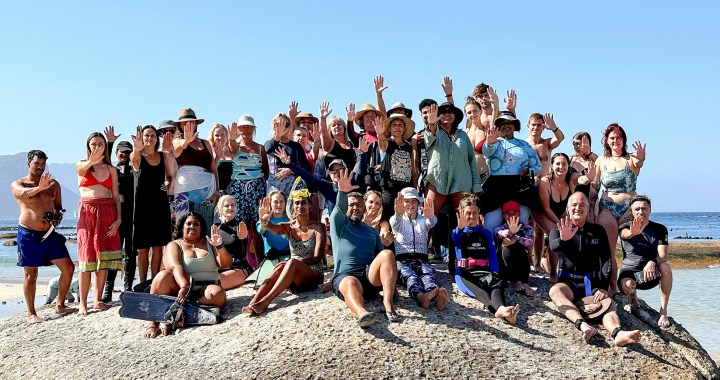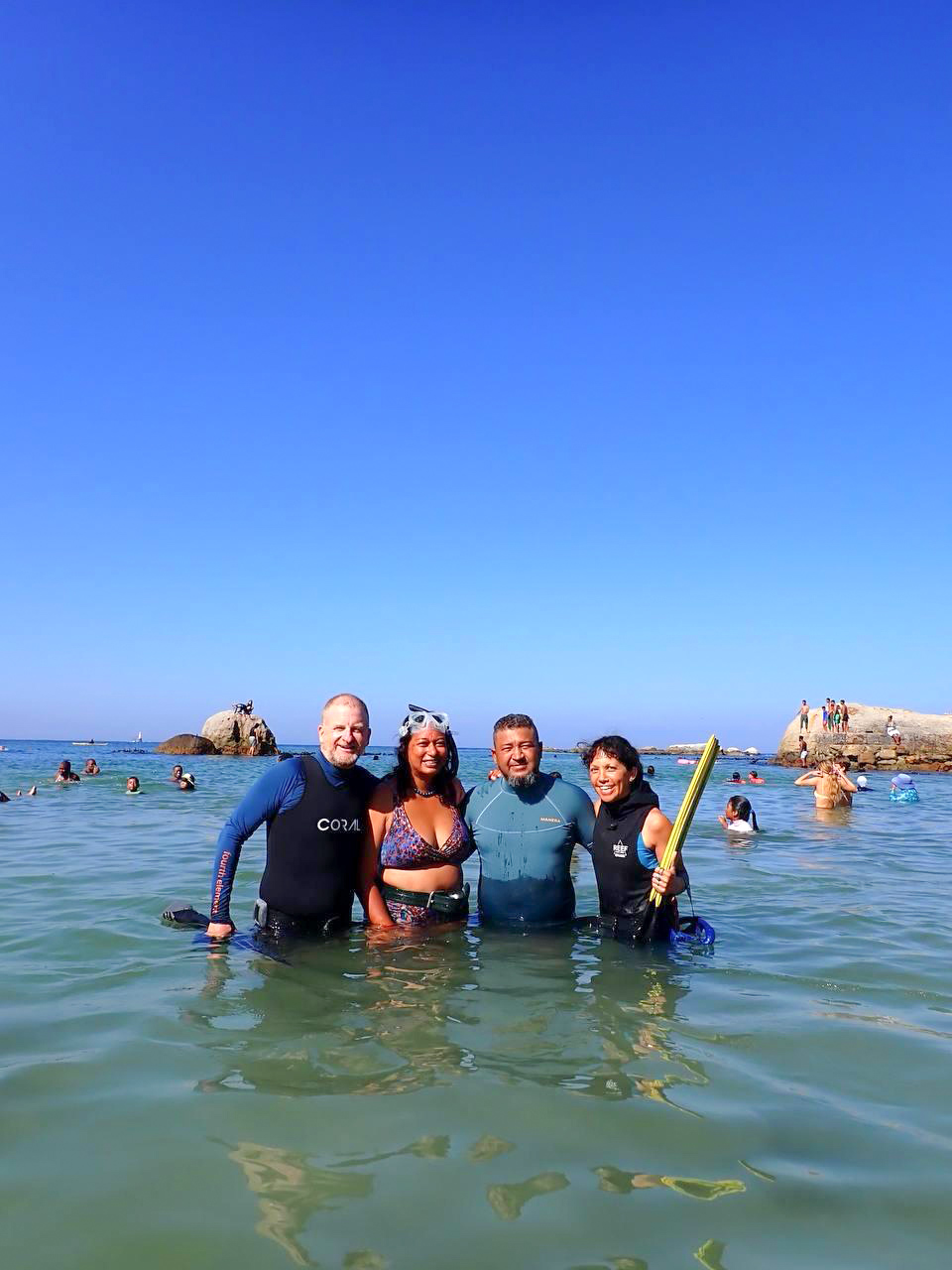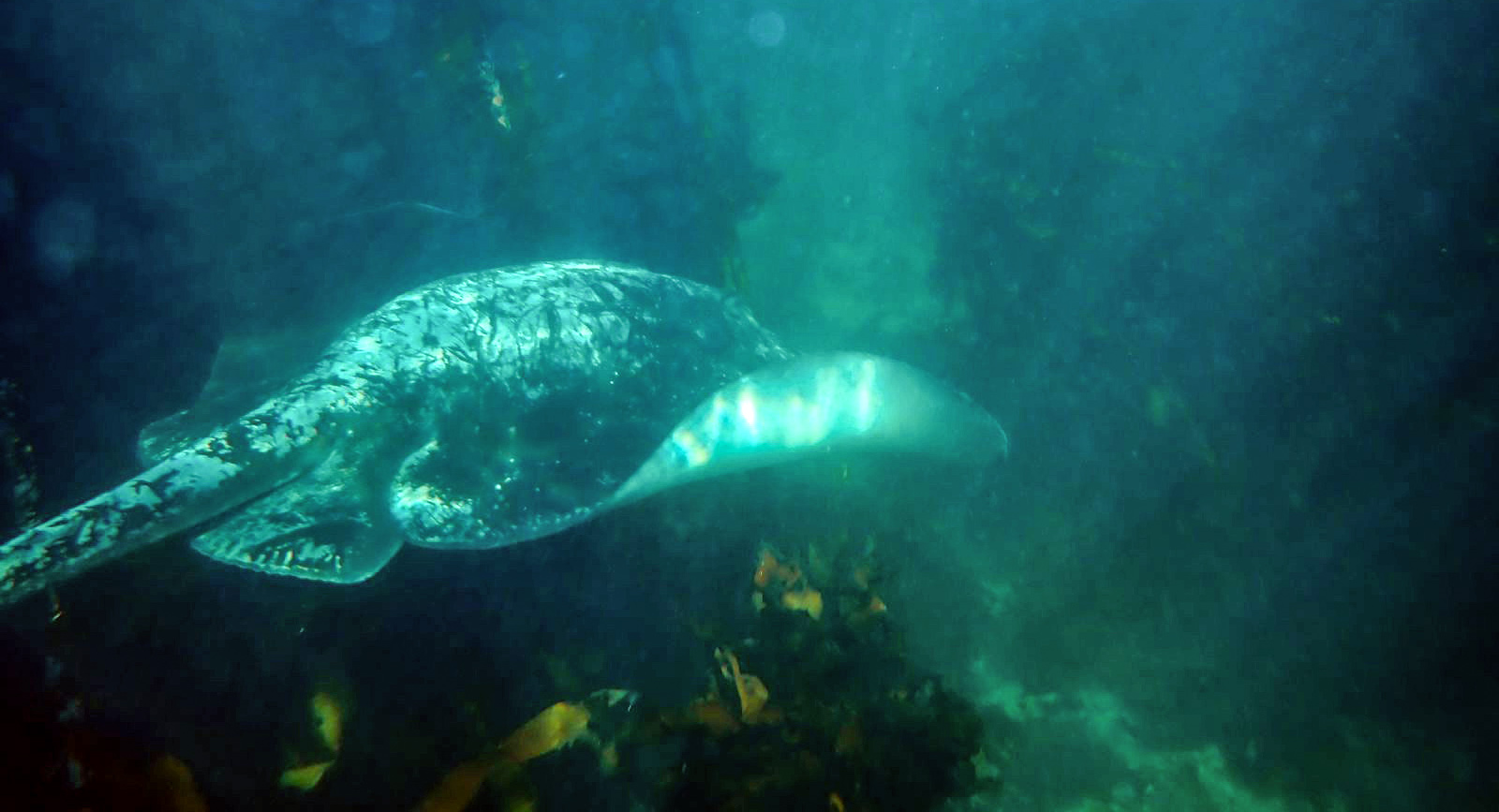CIVIL SOCIETY CONQUEST
SA Navy’s underwater explosives exercises to be moved from Simon’s Town MPA after public protests

Opposition from the Simon’s Town community, ocean groups and environmental nonprofits to the SA Navy’s underwater explosives training has yielded a huge win. The Department of Forestry, Fisheries and the Environment announced that the exercises had to be moved outside the Simon’s Town Marine Protected Area.
On Wednesday, 31 January, Simon’s Town residents were alarmed to find that the Navy’s “underwater demolitions training exercise for divers” had begun, with locals sharing pictures and videos of the activity. It had been scheduled to take place between 22 January and 1 February within the Simon’s Town Marine Protected Area (MPA), near Seaforth.
When the announcement of this activity was made, civil society groups voiced concerns about the potential effects on marine life, particularly the African penguin colony at Boulders Beach, which is close to the training exercise area.

From left: Barry Lewis, Aaniyah Martin, Shamier Magmoet and Roushanna Gray joined the paddle-out against the navy’s underwater explosives training activity. (Photo: Aakifah Magmoet)
Residents and environmental groups sent their objections via email and held a community dive, paddle-outs and daily protests outside the Simon’s Town Naval Base.
Read more in Daily Maverick: Penguin safety worries as navy readies Simon’s Town underwater demolition training exercise
Following this, Environment Minister Barbara Creecy and Defence Minister Thandi Modise agreed that the activity needed to be moved and, with SANParks, are discussing alternative locations.
This was hailed as a huge win for conservation. However, many remain concerned about the lack of transparency, the need for further collaboration in decision-making processes to avoid similar incidents in the future, and the gap in legislation around the regulation of marine noise that allowed this activity to take place in an MPA in the first place.
Kate Handley, an environmental attorney and the co-founder of the Biodiversity Law Centre, said the decision “has just been so encouraging. I mean, it’s been a little bit of a mini Shell moment, seeing the kind of attention that this issue has gotten and people really standing up for these endangered species.
“I think half the reason that an agreement was eventually reached between the ministers of defence and the environment was principally because there had been such an uproar about the impacts of these navy activities on endangered species and the marine environment.”
Community protest
On Sunday, 4 February, a community dive was hosted at Seaforth Beach by The Beach Co-op calling on people to snorkel, swim and dive in protest against the demolitions training exercise.
The Beach Co-op, a nonprofit organisation, added its concerns about the potential impact of the underwater blasting on endangered species and hoped for more transparency and collaboration in decision-making processes to avoid similar incidents in the future.
Aaniyah Martin, the founder of The Beach Co-op, told Daily Maverick, “These animals are literally a few kilometres away from the site. It gave us so much hope and courage to continue having our voices heard and trying to make a difference and trying to get some response from the navy.”
Martin said they had gathered at Seaforth Beach “as an ocean-loving community that cares for our marine environment”. During the group swim and snorkelling event, they encountered two stingrays, a guitar shark and an octopus.

While doing the paddle-out, the group came across a stingray and viewed it as a reminder of the sensitive and significant marine life near the navy’s underwater blasting area. (Photo: Aaniyah Martin)
Extinction Rebellion Cape Town, Simon’s Town residents and other environmental groups also held daily protests between 22 January and 1 February outside the Simon’s Town Naval Base.
Martin said The Beach Co-op, with the rest of civil society that had voiced concerns and protested against the activity, was thrilled by the decision.
“What we do ask for though is more transparency, being more open earlier on in this process to avoid this from happening altogether. We want to work collaboratively. We don’t want to work against the navy or SANParks. We really want to engage and be as supportive as we possibly can in decisions that benefit all of us.
“There is no real way of trying to understand how these decisions get made, and so we wanted to take a stance against that primarily; against the decisions which are not inclusive and that don’t really make sense. A conversation and engagement with the citizens of Cape Town would be useful and most welcome,” she said.
The Wildlife and Environment Society of Southern Africa (Wessa) also raised concerns. Patrick Dowling, Wessa’s Western Cape regional chair, said the Department of Forestry, Fisheries and Environment (DFFE) had a duty of care to intervene.
“Not doing everything that can be done to intervene and help rectify potentially destructive human practices, in South Africa at least, compromises the constitutional provision that ‘everyone has the right to have the environment protected, for the benefit of present and future generations, through reasonable legislative and other measures that prevent pollution and ecological degradation [and] promote conservation’,” Dowling said.
The Sea Change Project, a nonprofit environmental storytelling organisation dedicated to the Great African Seaforest, also raised concern that the Great African Seaforest lies on the edge of the area where the underwater blasts are planned and that the blasts could have an impact on marine life in this system.
“The navy has said that it’s been carrying out this exercise for 60 years now and that they haven’t seen any discernible difference or damage to the environment. But there has been no scientific environmental assessment to back up that statement. Sea Change Project would like to support other concerned parties in the request for a detailed environment assessment report,” the project said.
Environmental monitoring
When asked if an Environmental Impact Assessment (EIA) had been conducted for the underwater blasting, DFFE spokesperson Peter Mbelengwa said they were engaging with the Department of Defence (DoD) and other role players to ensure that any environmental impacts were mitigated and that the required environmental monitoring was conducted during the training exercises.
“A meeting was held between the navy, DFFE and SANParks to discuss this matter, including whether any mitigation and monitoring measures could be put in place. During the meeting, the navy advised that this is not a new practice and has been taking place regularly since 1984 as part of naval training,” Mbelengwa said.
The DoD, with SANParks and the DFFE, are developing a mitigation and monitoring plan which will include pre- and post-training monitoring and observation of seabirds breeding near the site.
SANParks spokesperson JP Louw said their marine biologists would use hydrophone and camera equipment to monitor the environment underwater before and during the exercises.
Mbelengwa added, “Given that these activities take place in an MPA, it is important to determine their impacts as activities which cause an adverse effect on the coastal environment are not currently permitted in MPAs.
“It is, however, noted that the site has been designated as a training site since the ’80s in terms of the DoD’s legislative framework, which pre-dates the MPA. This is currently being explored by the three entities.”
Legal gaps
Handley, from the Biodiversity Law Centre, highlighted the lack of legal mechanisms for regulating underwater noise in South Africa which allow such activity to take place, potentially harming the endangered African penguin population.
One of the Biodiversity Law Centre’s programmes works on African penguin conservation.
“We are extremely concerned about the [African penguin] population, which has seen a global decline. It has more than halved in the last decade and has now fallen below 10,000 breeding pairs, which is dire for the species. We’re seeing an 8% per annum population decline.
“Penguins face a number of threats. There is ship-to-ship bunkering occurring and in Algoa Bay, competition with small pelagic commercial fisheries. The species needs to be conserved as best possible and to have activities like this occurring within an MPA within about 1.5 kilometres from the Boulders Beach colony is extremely concerning.”
Handley outlined existing legislation that Creecy could have invoked to prohibit this activity, such as the National Environmental Management Protected Areas Act and the National Environmental Management Integrated Coastal Management Act.
“It would have been a sound response to a potential threat to endangered species.”
The Biodiversity Law Centre is investigating the issue “because we’re concerned that there’s just no regulation of underwater noise in South Africa”.
However, while there are no EIA requirements regarding marine noise in SA’s regulations, it could fall under other legislative mechanisms.
Handley said, “First off, in terms of the country’s Protected Areas legislation, no person is permitted to undertake activities that will have an adverse effect on the marine environment, destroy or alter the natural environment.
“I would argue that blasting within 1.5km of an endangered species’ breeding ground would almost certainly have an effect on the marine environment… We aren’t 100% certain of the nature and extent of the impacts this blasting has caused on the African penguin colony.”
Handley said a precautionary principle should always be taken in such matters, especially when it concerns an endangered species.
“The navy has just done what they’ve always done. It’s incumbent on the environment minister to actually take steps as the custodian of the coastal environment and protected areas, to prevent any threat of an adverse impact on the coastal environment,” Handley said. DM






















 Become an Insider
Become an Insider
Why do civilians have to protest for things like this? Why don’t our leaders think of these things. We have so many ministers in Government surely they can think of the consequences of doing this in a conservation area.
Well done to all the people and organizations taking up this issue and holding the authorties accountable. Hopefully this will lead to greater transparency and more rational decisions in future.
I think we know the answer, most of our so called leaders would be challenged by the 2 short planks
We could start by getting rid of all the expensive and unnecessary deputy ministers. This might give the rest of our bloated cabinet who appear to know nothing about conservation, a wake up call. All and any kind of blasting that threatens our sea life (already struggling against plastic pollution) needs to scrutinised and those responsible for any damage held accountable.
I know of a “fire pool” that would be perfectly suited to this operation.
Excellent idea maybe suggest it !!??
Saw the blast from my home in Simonstown on 31 Jan, with seaspray surpassing the height of the two cranes. The second time this has occurred in 2 months. Its hard to believe this has only become an issue since the Navy issued a warning in early Jan. Was there no concern or not noticed before?
Considering most of the dockyard has seen little movement in the 6 months I have lived above it, I find it hard to believe how the Navy still functions? And why of all the efforts it could adopt (e.g anti-poaching) blasting exercises get the sign off? Seems bizarre.
Please can you ban / block Pamela Khumalo and her ilk??? Should not be allowed to be on this forum.
Well Done Simon’s Town residents and nature lovers. Three Cheers!!
Taking this to the next level, why not get rid of the Navy and repurpose it as a Coast Guard that protects our fisheries and marine sanctuaries? Let’s be honest: if a nation attacked SA (highly unlikely) the SA Navy would not be capable of defending the nation. There is no money to do it.